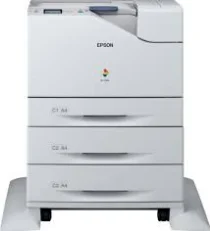
The Epson WorkForce AL-C500DHN printer boasts an impressive resolution of 4800 RIT at an enhanced 1200 x 1200 dots per inch (dpi), thanks to its AcuBrite toner system with a departmental office component. This machine is capable of printing at a remarkable speed of 45 pages per minute for both monochrome and color printing, whether in simplex or duplex mode.
What’s more, the Epson WorkForce AL-C500DHN comes with an internal driver that enables duplex or two-sided printing. With this feature, users can enjoy the benefits of printing on both sides of the paper without having to manually flip it over.
Epson WorkForce AL-C500DHN Printer Driver Downloads
Driver for Windows
| Filename | Size | Download | |
| Printer Driver for Windows 10 8 7 vista xp 32 bit.exe (Recommended) | 10.71 MB | ||
| Printer Driver for Windows 11 10 8 7 vista xp 64 bit.exe (Recommended) | 14.37 MB | ||
| Universal Print Driver for Windows 11 10 8 7.exe (Recommended) | 54.13 MB | ||
| PostScript 3 Driver for windows 7 vista xp.zip (Recommended) | 130.28 kB | ||
| Standard Business Printer Driver for windows 8 7.msi (Recommended) | 27.58 MB | ||
| Download Epson WorkForce AL-C500DHN driver from Epson website | |||
Driver for Mac OS
| Filename | Size | Download | |
| PS Unified Driver for Mac OS X 10.5 to 11.dmg | 2.61 MB | ||
| PostScript 3 Driver for mac OS X 10.5 to 10.12.dmg | 1.62 MB | ||
| Uninstall Center for mac OS X 10.15 and 11.dmg | 1.17 MB | ||
| Download Epson WorkForce AL-C500DHN driver from Epson website | |||
Specifications
According to our testing, the initial page output time for black and white documents is approximately 7 seconds, whereas color documents take roughly 8 seconds. Additionally, this device requires around 30 seconds to prepare for operation and can churn out up to 120,000 pages per month!
In regards to connectivity, this machine boasts a USB 2.0 type B port, a Gigabot Ethernet interface, and a type B interface. Furthermore, it supports an array of network printing protocols, including LPR, IPP, FTP, Port 9100, Net BIOS, WSD, and AppleTalk.
With its impressive performance and extensive connectivity options, this device is a force to be reckoned with in the world of printing technology.
Related Printer : Epson WorkForce AL-C500DN Driver
The Epson WorkForce AL-C500DHN printer supports a variety of network management protocols, including SNMP, HTTP, BOOTP, APIPA, DHCP, DDNS, and SSDP. This wide range of protocols ensures that the printer can be easily integrated into any network environment with ease.
In addition to its versatile network capabilities, the printer also supports multiple paper formats, including A4, C6, DL envelopes, A5, A6, B5, Letter, half-letter, legal, executive, and monarch. This range of paper formats ensures that users have flexibility when it comes to printing documents of various sizes and formats.
Under ideal conditions, the Epson WorkForce AL-C500DHN printer also supports duplex printing, which allows users to print on both sides of the paper, saving time and resources. The standard paper input tray can hold up to 1800 sheets of plain paper, while the MP tray can hold up to 150 sheets. Additionally, another loading tray can hold up to 1650 sheets, providing ample paper storage for large printing jobs.
Overall, the Epson WorkForce AL-C500DHN printer is a versatile and reliable option for businesses and individuals who require a high-quality printing solution. With its wide range of network management protocols and paper formats, it can easily meet the needs of any printing environment.
With regards to the output paper tray, it has the capacity to hold up to 500 sheets of printed paper, making it a highly efficient machine. In fact, this printer boasts four trays, which contributes significantly to its overall productivity. When it comes to power specifications, it is designed to operate within a supply voltage range of 220 to 240V, with a frequency range of 50 to 60 Hz. However, it is important to note that the power consumption of this printer varies depending on the model. For instance, the maximum power usage can reach 1380 watts, while printing typically utilizes around 556 watts.